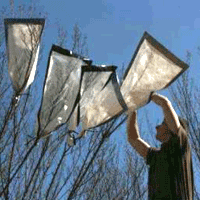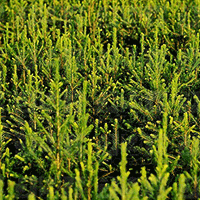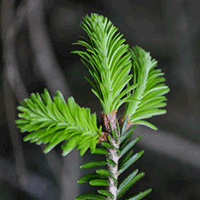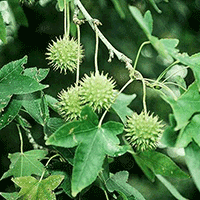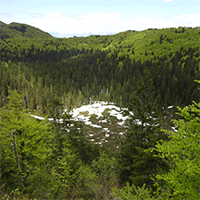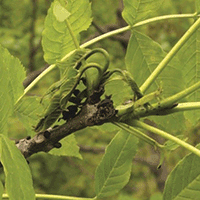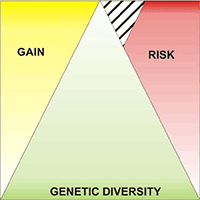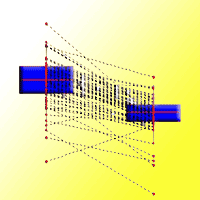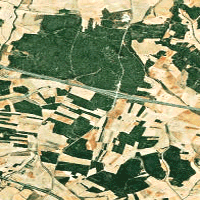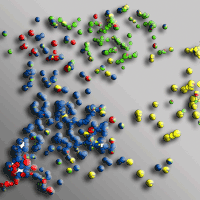Seedlings obtained by crossing Ulmus minor and U. minor × U. pumila clones were assessed for flowering, bark beetle damage, vegetative budburst, height growth and resistance to Ophiostoma novo-ulmi. Ramets and open pollinated seedlings obtained from the parent trees were assessed for the same traits. Most progenies had similar traits to their parents, but some presented heterosis in annual growth or resistance to O. novo-ulmi. Leaf wilting was significantly lower in progenies with U. minor × U. pumila rather than U. minor as female parent (21.5 and 30.6%, respectively; P<0.05). Resistance to O. novo-ulmi increased significantly as a function of increased amounts of U. pumila germplasm from the female parent, suggesting that resistance to Dutch elm disease is primarily transmitted from the mother. Budburst occurred earlier in seedlings with low rather than high growth rates (P=0.0007) and percentage of wilting was negatively related to early budburst (P<0.0001). Other phenotypic relations included percentage of flowering trees and annual height growth (rp=0.44; P=0.0042), percentage of flowering trees and vegetative budburst (rp=-0.53; P=0.0004) and percentage of beetle-affected trees and annual height growth (rp=0.60; P<0.0001). Heritability estimates obtained from the regression and variance components methods ranged from 0.06 ± 0.04 to 0.64 ± 0.18, 0.10 ± 0.05 to 0.69 ± 0.17, and 0.13 ± 0.32 to 0.71 ± 0.22 for budburst, growth and tolerance to O. novo-ulmi, respectively. Broad- and narrow-sense heritability values were higher when estimated 60 days post inoculation (dpi) than 15, 30 or 120 dpi. Heritability estimates and genetic gains reported indicate a high degree of additive genetic control and show the effectiveness of selection for Dutch elm disease resistance and rapid tree growth.
Keywords
, , , , , , ,
Citation
Solla A, López-Almansa JC, Martín JA, Gil L (2014). Genetic variation and heritability estimates of Ulmus minor and Ulmus pumila hybrids for budburst, growth and tolerance to Ophiostoma novo-ulmi. iForest 8: 422-430. - doi: 10.3832/ifor1227-007
Academic Editor
Alberto Santini
Paper history
Received: Dec 31, 2013
Accepted: Sep 23, 2014
First online: Dec 15, 2014
Publication Date: Aug 02, 2015
Publication Time: 2.77 months
© SISEF - The Italian Society of Silviculture and Forest Ecology 2014
Open Access
This article is distributed under the terms of the Creative Commons Attribution-Non Commercial 4.0 International (https://creativecommons.org/licenses/by-nc/4.0/), which permits unrestricted use, distribution, and reproduction in any medium, provided you give appropriate credit to the original author(s) and the source, provide a link to the Creative Commons license, and indicate if changes were made.

Breakdown by View Type
(Waiting for server response...)
Article Usage
Total Article Views: 58100
(from publication date up to now)
Breakdown by View Type
HTML Page Views: 47686
Abstract Page Views: 4072
PDF Downloads: 4643
Citation/Reference Downloads: 53
XML Downloads: 1646
Web Metrics
Days since publication: 4069
Overall contacts: 58100
Avg. contacts per week: 99.95
Article Citations
Article citations are based on data periodically collected from the Clarivate Web of Science web site
(last update: Mar 2025)
Total number of cites (since 2015): 23
Average cites per year: 2.09
Publication Metrics
by Dimensions ©
Articles citing this article
List of the papers citing this article based on CrossRef Cited-by.
(1)
Bloom JS, Ehrenreich IM, Loo W, Vo Lite TL, Kruglyak L (2013)Finding the sources of missing heritability in a yeast cross. Nature 494: 234-237.
CrossRef |
Gscholar
(2)
Brasier CM (2000)Intercontinental spread and continuing evolution of the Dutch elm disease pathogens. In “The Elms: Breeding, Conservation and Disease Management” (Dunn CP ed). Kluwer Academic Publishers, New York, NY, USA, pp. 61-72.
CrossRef |
Gscholar
(3)
Bridgewater F (1992)Mating designs. In: “Handbook of quantitative forest genetics” (Fins L, Friedman ST, Brotschol JV eds). Kluwer Academic Publisher, Dordrecht, The Netherlands, pp. 69-95.
CrossRef |
Gscholar
(4)
Cogolludo-Agustín MA, Agúndez D, Gil L (2000)Identification of native and hybrid elms in Spain using isozyme gene markers. Heredity 85: 157-166.
CrossRef |
Gscholar
(5)
Falconer DS, Mackay TFC (1996)Introduction to quantitative genetics. Longmann & co, London, UK, pp. 464.
Gscholar
(6)
Fehr WR (1987)Principles of cultivar development’theory and technique (vol. 1). Iowa State University Press, Ames, USA, pp. 539.
Gscholar
(7)
Ghelardini L, Santini A (2009)Avoidance by early flushing: a new perspective on Dutch elm disease research. iForest 2: 143-153.
CrossRef |
Gscholar
(8)
Hallauer AR, Miranda JB (1988)Quantitative genetics in maize breeding. Iowa State University Press, Ames, IA, USA, pp. 468.
Gscholar
(9)
Helander ML, Vuorinen P, Saikkonen K, Lappalainen J (1998)Evidence for resistance of mountain birch (
Betula pubescens ssp.
czerepanovii) to birch rust (
Melampsoridium betulinum). Mycological Research 102: 63-66.
CrossRef |
Gscholar
(10)
Heslop-Harrison J, Heslop-Harrison Y (1970)Evaluation of pollen viability by enzymatically induced fluorescence: intracellular hydrolysis of fluorescein diacetate. Stain Technology 45: 115-120. -
Online |
Gscholar
(11)
Heybroek HM (1957)Elm breeding in the Netherlands. Silvae Genetica 6: 112-117.
Gscholar
(12)
Le Cocq TL, Quiring D, Verrez A, Park YS (2005)Genetically based resistance of black spruce (
Picea mariana) to the yellowheaded spruce sawfly (
Pikonema alaskensis). Forest Ecology and Management 215: 84-90.
CrossRef |
Gscholar
(13)
Lefevre F, Pichot C, Pinon J. (1994)Intraspecific and interspecific inheritance of some components of the resistance to leaf rust (
Melampsora-larici populina Kleb) in poplars. Theoretical and Applied Genetics 88: 501-507.
CrossRef |
Gscholar
(14)
Lester DT, Smalley EB (1972a)Response of backcross hybrids and three-species combinations of
Ulmus pumila, Ulmus japonica, and
U. rubra to inoculation with
Ceratocystis ulmi. Phytopathology 62: 845-848.
CrossRef |
Gscholar
(15)
Lester DT, Smalley EB (1972b)Response of Ulmus pumila and Ulmus pumila × rubra hybrids to inoculation with Ceratocystis ulmi. Phytopathology 62: 848-852.
CrossRef |
Gscholar
(16)
Lester DT, Smalley EB (1972c)Variation in ornamental traits and disease resistance among crosses of
Ulmus pumila, U. rubra, and putative natural hybrids. Silvae Genetica 21: 193-197.
Online |
Gscholar
(17)
López-Almansa JC, Pannell JR, Gil L (2003)Female sterility in
Ulmus minor (Ulmaceae): a hypothesis invoking the cost of sex in a clonal plant. American Journal of Botany 90: 603-609.
CrossRef |
Gscholar
(18)
López-Almansa JC, Yeung EC, Gil L (2004)Abortive seed development in
Ulmus minor (Ulmaceae). Botanical Journal of the Linnean Society 145: 455-467.
CrossRef |
Gscholar
(19)
Martín JA, Solla A, Woodward S, Gil L (2005)FT-IR spectroscopy as a new method for evaluating host resistance in the Dutch elm disease complex. Tree Physiology 25: 1331-1338.
CrossRef |
Gscholar
(20)
Martín JA, Solla A, Domingues MR, Coimbra MA, Gil L (2008)Exogenous phenol increase resistance of
Ulmus minor to Dutch elm disease through formation of suberin-like compounds on xylem tissues. Environmental and Experimental Botany 64: 97-104.
CrossRef |
Gscholar
(21)
Martín JA, Solla A, Esteban LG, de Palacios P, Gil L (2009)Bordered pit and ray morphology involvement in elm resistance to
Ophiostoma novo-ulmi. Canadian Journal of Forest Research 39: 420-429.
CrossRef |
Gscholar
(22)
Martín JA, Solla A, Witzell J, Gil L, García-Vallejo MC (2010)Antifungal effect and reduction of
Ulmus minor symptoms to
Ophiostoma novo-ulmi by carvacrol and salicylic acid. European Journal of Plant Pathology 127: 21-32.
CrossRef |
Gscholar
(23)
Martín JA, Solla A, García-Vallejo MC, Gil L (2012)Chemical changes in
Ulmus minor xylem tissue after salicylic acid or carvacrol treatments are associated with enhanced resistance to
Ophiostoma novo-ulmi. Phytochemistry 83: 104-109.
CrossRef |
Gscholar
(24)
Martín JA, Solla A, Ruiz-Villar M, Gil L (2013)Vessel length and conductivity of
Ulmus branches: ontogenetic changes and relation to resistance to Dutch elm disease. Trees 27: 1239-1248.
CrossRef |
Gscholar
(25)
Martín JA, Solla A, Venturas M, Collada C, Domínguez J, Miranda E, Fuentes P, Burón M, Iglesias S, Gil L (2014)Seven
Ulmus minor clones tolerant to
Ophiostoma novo-ulmi registered as forest reproductive material in Spain. iForest (early view): e1-e9.
CrossRef |
Gscholar
(26)
Mittempergher L, La Porta N (1991)Hybridization studies in the Eurasian species of elm (
Ulmus spp.). Silvae Genetica 40: 237-243.
Gscholar
(27)
Mittempergher L, Santini A (2004)The history of elm breeding. Investigación Agraria: Sistemas y Recursos Forestales 13: 161-177.
Online |
Gscholar
(28)
Nyquist WE (1991)Estimation of heritability and prediction of selection response in plant populations. Critical Reviews in Plant Sciences 10: 235-322.
CrossRef |
Gscholar
(29)
Pinon J, Husson C, Collin E (2005)Susceptibility of native French elm clones to
Ophiostoma novo-ulmi. Annals of Forest Science 62: 689-696.
CrossRef |
Gscholar
(30)
Pope SA (1943)Some studies on the Dutch Elm Disease and the causal organism. Doctoral thesis, Cornell University, Ithaca, NY, USA, pp. 61.
Gscholar
(31)
Richens RH (1983)Elm. Cambridge University Press, Cambridge, UK, pp. 347.
Online |
Gscholar
(32)
Santini A, Ghelardini L, Falusi M, Bohnens J, Buron M, Collin E, Solla A, Vanden Broeck A (2004)Vegetative budburst variability of European elms. Investigación Agraria: Sistemas y Recursos Forestales 13: 37-45.
Online |
Gscholar
(33)
Santini A, Fagnani A, Ferrini F, Ghelardini L, Mittempergher L (2005)Variation among Italian and French elm clones in their response to
Ophiostoma novo-ulmi inoculation. Forest Pathology 35: 183-193.
CrossRef |
Gscholar
(34)
Solla A, Gil L (2002)Influence of water stress on Dutch elm disease symptoms in
Ulmus minor Miller. Canadian Journal of Botany 80: 810-817.
CrossRef |
Gscholar
(35)
Solla A, Gil L (2003)Evaluating
Verticillium dahliae for biological control of
Ophiostoma novo-ulmi in
Ulmus minor. Plant Pathology 52: 579-585.
CrossRef |
Gscholar
(36)
Solla A, Bohnens J, Collin E, Diamandis S, Franke A, Gil L, Burón M, Santini A, Mittempergher L, Pinon J, Vanden Broek A (2005a)Screening European elms for resistance to
Ophiostoma novo-ulmi. Forest Science 51: 134-141.
Online |
Gscholar
(37)
Solla A, Martín JA, Ouellette G, Gil L (2005b)Influence of plant age on symptom development in
Ulmus minor following inoculation by
Ophiostoma novo-ulmi. Plant Disease 89: 1035-1040.
CrossRef |
Gscholar
(38)
Solla A, Dacasa MC, Nasmith C, Hubbes M, Gil L (2008)Analysis of Spanish populations of
Ophiostoma ulmi and
O. novo-ulmi using phenotypic characteristics and RAPD markers. Plant Pathology 57: 33-44.
CrossRef |
Gscholar
(39)
Strong DR, Larsson S, Gullberg U (1993)Heritability of host plant resistance to herbivory changes with gall midge density during an outbreak on willow. Evolution 47: 291-300.
CrossRef |
Gscholar
(40)
Tchernoff V (1965)Methods for screening and for the rapid selection of elms for resistance to Dutch elm disease. Acta Botanica Neerlandica 14: 409-452.
CrossRef |
Gscholar
(41)
Venturas M, López R, Martín JA, Gascó A, Gil L (2014)Heritability of
Ulmus minor resistance to Dutch elm disease and its relationship to vessel size, but not to xylem vulnerability to drought. Plant Pathology 63: 500-509.
CrossRef |
Gscholar
(42)
Vivas M, Martín JA, Gil L, Solla A (2012a)Evaluating methyl jasmonate for induction of resistance to
Fusarium oxysporum, F. circinatum and
Ophiostoma novo-ulmi. Forest Systems 21: 289-299.
CrossRef |
Gscholar
(43)
Vivas M, Zas R, Solla A (2012b)Screening of Maritime pine (
Pinus pinaster) for resistance to
Fusarium circinatum, the causal agent of Pitch Canker disease. Forestry 25: 185-192.
CrossRef |
Gscholar
(44)
White TL, Adams WT, Neale DB (2007)Forest genetics. CABI Publications, Cambridge, MA, USA, pp. 682.
Online |
Gscholar
(45)
Zas R, Solla A, Sampedro L (2007)Variography and kriging allow screening
Pinus pinaster resistant to
Armillaria ostoyae in field conditions. Forestry 80 (2): 201-209.
CrossRef |
Gscholar
(46)
Zürcher ER (1986)Sprossachsen-Ontogenie der Bergulme (
Ulmus glabra Huds.), bei Normal- und Langtagbedingungen [Stem ontogeny of Wych elm (
Ulmus glabra Huds.) under normal and long day conditions]. Vierteljahrsschrift der Naturforschenden Gesellschaft in Zürich 131: 235-294.
Gscholar
